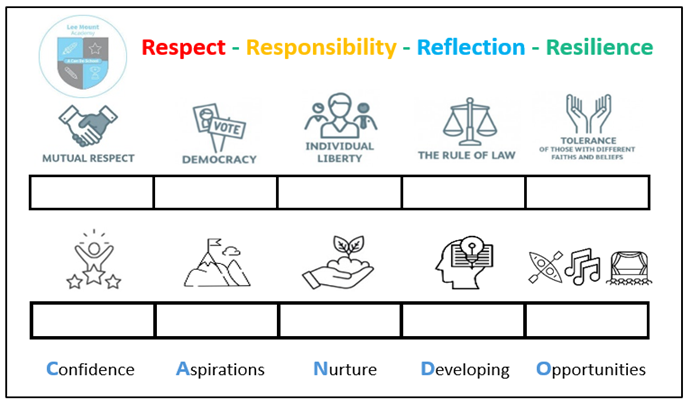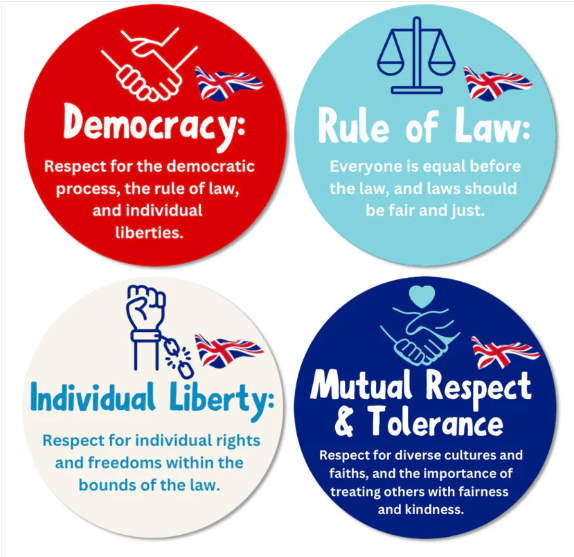We aim to actively promote British values in our school to ensure young people leave school prepared for life in modern Britain. Pupils are encouraged to regard people of all faiths, races and cultures with respect and tolerance and understand that while different people may hold different views about what is ‘right’ and ‘wrong’, all people living in England are subject to its law.
The key British values are:
- Democracy
- Rule of Law
- Individual Liberty
- Mutual Respect
- Tolerance of those of different faiths and beliefs
We aim to teach British values not as an episodic piece of learning but entwined through our curriculum and personal development offer. We link British values to our school core values of respect, responsibility, resilience and reflection as we want these values to be internalised and not just learned. We want all our pupils and families to follow the key British values both in school and within their local community and beyond.


Pupils learn about British Values as part of our curriculum. They are themes within our assembly timetable and part of our class happy healthy time initiative. We link national and local events where possible to the British values. An example is the nomination of school council members linked to democracy. We don’t just explain about how the political system works, but the skills required to become an effective council representative and link this to being a successful MP. The understanding of these skills are what we believe will create positive active citizens.
Below, outlines how the academy teaches pupils about British values and how they can be applied to their life at Lee Mount and to then become active citizens in the local community:
Democracy – what do we do?
- Class voting for the election of school councillors at the start of the year;
- Annual school wide campaign and election for our head boy/girl;
- Provide pupils with a broad general knowledge of, and promote respect for, public institutions and services;
- Teach pupils how they can influence decision-making through the democratic process;
- Taught through assemblies and our school curriculum;
- Teach a dedicated topic on the civil rights movement (protests and politics) in Year 5
- Encourage pupils to become involved in decision-making processes and ensure they are listened to in school;
- Help pupils to express their views;
- Model how perceived injustice can be peacefully challenged;
- Pupils vote as to which after schools we should provide;
- Pupil and parent questionnaires to give stakeholder voice in school improvement
- Visit by Kate Dearden, our local MP
- School council trip to the Houses of Parliament
Rule of law – what do we do?
- Ensure school rules and expectations are clear and fair;
- Use of restorative practises to ensure pupils understand the reason for consequences
- Class rules and celebration of adhering to these rules;
- Help pupils to distinguish right from wrong;
- Help pupils to respect the law and the basis on which it is made;
- Help pupils to understand that living under the rule of law protects individuals;
- Explore within our Personal Development Lessons laws and what to do if peer pressure is trying to persuade children to break these;
- Annual visit from police to take about knife crime with Year 6
- Year 6 community project with ex police officer Sam Sagar
- Links with PSCO and other community leaders to reduce anti-social behaviour
Individual liberty – what do we do?
- Support pupils to develop their self-knowledge, self-esteem, self-confidence;
- Encourage pupils to take responsibility for their behaviour, as well as knowing their rights;
- Model freedom of speech through pupil participation, while ensuring protection of vulnerable pupils and promoting critical analysis of evidence
- Challenge stereotypes;
- Implement a strong anti-bullying culture;
- E-Safety units of work are taught throughout school and parents and staff receive training on these.
- Ensure those children that are part of groups with protected characteristics feel free from discrimination
Mutual Respect and tolerance of different cultures and religions– what do we do?
- We insist on respect and teach this from the earliest age;
- Challenge prejudicial or discriminatory behaviour;
- Organise visits to places of worship (one annually per year group);
- We use collaborative learning in classrooms to ensure that children are learning alongside different children
- Promote whole class debate on a range of topics
- Our RE scheme ensures that our children have a good understanding of a range of religious beliefs and customs
- Participate in different tournaments against schools with different demographics
- Help pupils to acquire an understanding of, and respect for, their own and other cultures and ways of life. Celebrate and respect different cultures beliefs an customs (e.g. Chinese new year, Diwali, Eid)
- Celebrate and promote diversity through our online communication platform with parents and carers